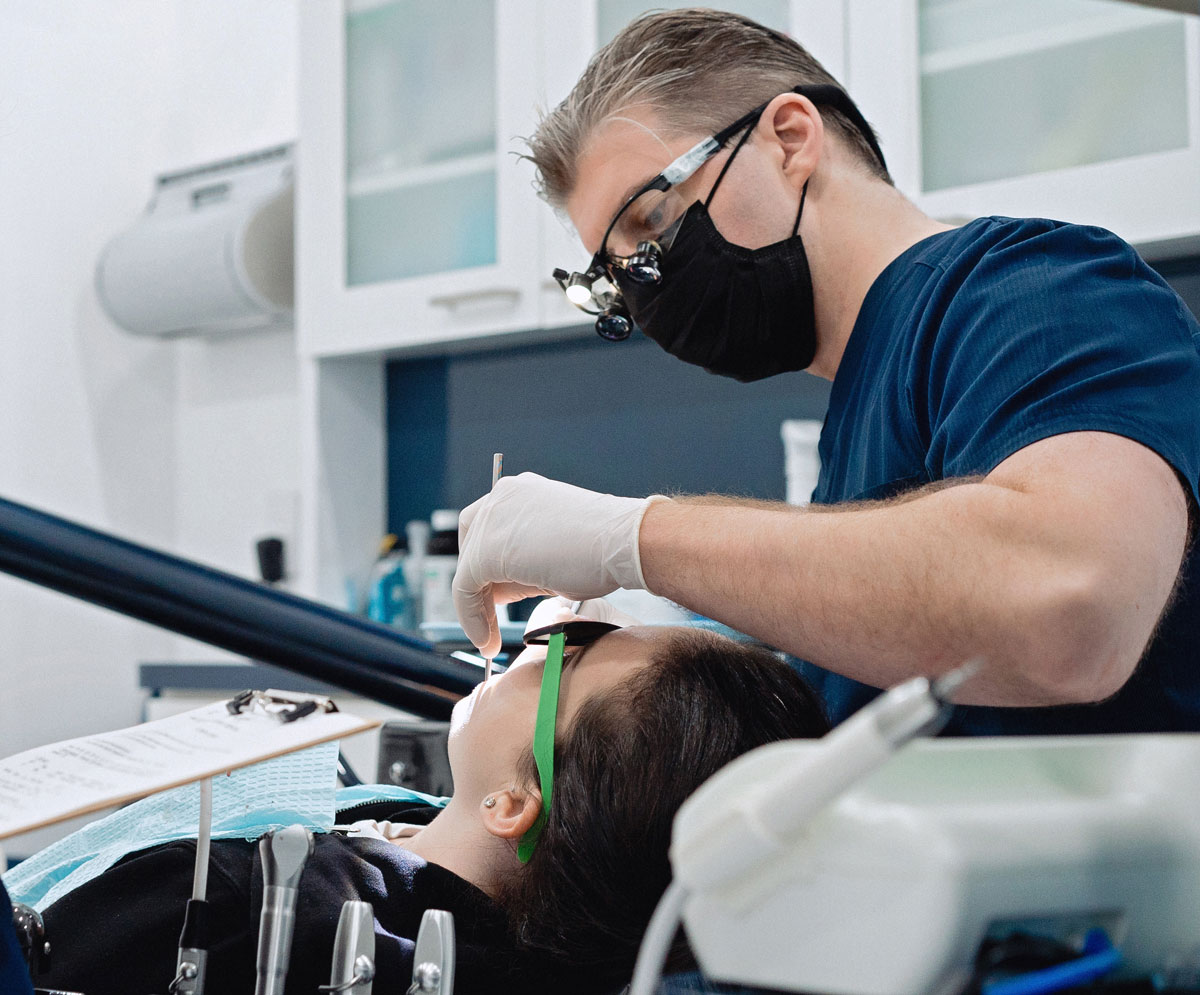If you have numerous dental concerns necessitating a collection of dental treatments for optimal restoration, you may be the ideal candidate for full mouth reconstruction. This is an umbrella term that describes a comprehensive, curated treatment that addresses all dental concerns, such as severe teeth grinding, loss of teeth due to injuries and trauma, gum problems, and more. Sunny Dental uses the most advanced diagnostic techniques to identify, trace, and treat all your dental concerns while facilitating a complete mouth rehabilitation.
What is Full Mouth Restoration?
Full mouth reconstruction, also known as full mouth restoration, full mouth rehabilitation, or dental reconstruction, is a collection of curated procedures that address all concerns related to the mouth. The dentist individually curates the ideal collection of dental treatments to rebuild or restore all the teeth in the upper or lower jaws or both. The procedure combines general dentistry, restorative dentistry, cosmetic dentistry, and many need to be performed by various types of dental specialists, such as endodontists, orthodontists, periodontists, etc.

Reasons for Dental Reconstruction
- Replace teeth lost due to injuries, accidents, dental decay, or other factors.
- Restore injured, fractured, or damaged teeth.
- Restore teeth that are severely ground down or worn due to bruxism or acid erosion.
- Restore optimal alignment to the teeth.
- Treat misalignment and occlusion problems leading to jaw pains, muscle aches, and headaches.
Your Assessment for Teeth Reconstruction
- Teeth: The dentist will examine your teeth to identify cracks, cavities, fractures, or other signs of wear and tear. Based on their assessment, they’ll determine if you need fillings, root canals, dental crowns, dental veneers, bridges, or dental implants.
- Gums: The dentist will examine your gum tissues to determine their health. If your gums are inflamed or infected, they’ll curate the ideal treatment plan. Minor gingivitis can be addressed with scaling and root planing, but advanced periodontitis may necessitate gum grafts, bone grafts, and other complex procedures.
- Jaws: The dentist will determine if you have jaw pains, teeth grinding, or other such problems due to your jaw muscles or general occlusion. An improper bite can lead to temporomandibular joint disorders and other complications. If you suffer from malocclusion, the dentist will recommend orthodontic treatments for bite alignment.
- Cosmetics: The dentist will examine the shape, size, color, and general appearance of your teeth and gums. If aspects of your teeth, such as their discoloration or proportionality, cause self-consciousness, the dentist may recommend cosmetic treatments, such as veneers and teeth whitening.
Your comprehensive teeth rehabilitation assessment may include x-rays, full mouth photographs, impressions of your lower and upper teeth, and overall impressions of your bite. They’ll also collaborate with other specialists, such as periodontists and orthodontists, to curate a comprehensive full mouth reconstruction plan. Everyone’s teeth reconstruction plan is unique — the dentist will lay down every step in your plan, including the treatment costs, insurance possibilities, and timeline.

Full Mouth Reconstruction May Include…
- General dental cleaning for prophylactic purposes.
- Root planing and periodontal treatment.
- Crown lengthening to expose more tooth structure.
- Orthodontic treatments to restore bite alignment.
- Repositioning of the jaws.
- Gum contouring to restore healthy and attractive gum tissues.
- Dental restorations, such as crowns, bridges, and dentures.
- Dental implants to replace missing teeth.
- Dental extractions to remove unhealthy or damaged teeth.
- Bone or gum grafting encourages healthy bone and soft tissue regeneration.

Whole Mouth Restoration vs. Smile Makeover
The primary difference between whole mouth restoration and a smile makeover is that the former is functional/ necessary, whereas the latter is cosmetic/ elective. Whole mouth restoration can include a smile makeover, but it primarily addresses functional concerns, such as bite misalignment, dental cracks, missing teeth, etc. Meanwhile, a smile makeover is completely elective and cosmetic.
Full Mouth Reconstruction Cost
Full mouth reconstruction is an incredibly personalized treatment — no two individuals need the same set of procedures. As such, there’s no point in looking at the average full mouth reconstruction cost. You must consult a dentist — they’ll examine your teeth, curate the ideal treatment plan, and provide a cost breakdown just for you.
Full Mouth Restoration FAQs
What is full mouth reconstruction?
Full mouth reconstruction is a makeover for your entire mouth. This involves several procedures aimed at restoring not just the look of your teeth but their health and function too. It’s something we consider for patients who have significant dental problems due to things like severe decay, accidents, or long-term wear and tear.
What are dental full mouth reconstruction steps?
Here’s what the typical process looks like:
- Comprehensive Dental Exam: First, we’ll do a thorough check-up using X-rays and 3D imaging.
- Treatment Planning: Next, our dentist will discuss all the procedures you’ll need.
- Preliminary Treatments: We may need to address any existing issues like gum disease first.
- Restoration Procedures: This is when our dentist will start the reconstruction process, whether it’s implants, crowns, or bridges.
- Adjustments: After the main procedures, we will make sure everything fits perfectly and feels comfortable.
- Follow-Up Care: Regular check-ups are crucial to ensure everything stays perfect.
How long does full mouth reconstruction take?
The time frame for a full mouth reconstruction varies—it can take anywhere from a few months up to a year or more, depending on the complexity of your case. Each step in the process has its own timing, especially because some treatments, like implants, need time to heal before we can proceed to the next step.
What are the benefits of full mouth reconstruction?
Opting for a full mouth reconstruction has several benefits:
- Improved Health: It takes care of multiple dental issues at once.
- Better Appearance: It significantly improves the look of your smile.
- Increased Comfort: It eliminates discomfort from damaged or missing teeth.
- Enhanced Functionality: It makes eating and speaking easier and more natural.
- Durable Results: With proper care, the results can last a very long time.
How to pay for a full mouth reconstruction?
Figuring out how to finance your full mouth reconstruction can seem daunting, but you have several options:
- Dental Insurance: Dental insurance can sometimes cover parts of the full mouth reconstruction if they’re considered necessary.
- Payment Plans: We offer financing options that let you spread the cost over time.
- Healthcare Credit Cards: These are credit cards specifically for medical expenses, which sometimes offer interest-free periods.
How much does a full mouth reconstruction cost?
The cost of full mouth reconstruction can vary. The cost depends on what exactly needs to be done—things like the number of implants and the type of materials used for crowns or bridges all play a part.
Does insurance cover full mouth reconstruction?
Depending on your specific dental insurance plan, you may receive partial or complete coverage for your full mouth reconstruction. However, the amount of coverage depends on numerous factors, including the specific procedures involved in your treatment. Please contact our dental clinic staff for an insurance coverage assessment.
At my age, I don’t need a brilliant smile. So why should I consider a full mouth reconstruction?
The necessity for full mouth reconstruction isn’t dependent on your age or the brilliance of your smile. This procedure is necessary to address functional and medical concerns, such as missing teeth, severed decayed teeth, gum problems, and more. As such, full mouth reconstruction is necessary to maintain oral health and overall health.
Why is gum restoration part of this comprehensive approach?
Gum restoration is a part of the comprehensive full mouth restoration because periodontal concerns can affect your teeth and overall health. Periodontal disease, if left untreated, can eventually cause infections and loss of teeth. As such, full mouth restoration must include gum restoration.
Is a full mouth reconstruction the same as a smile makeover?
No. A full mouth reconstruction is a functional and necessary procedure, whereas a smile makeover is a cosmetic procedure.
What’s the difference between full mouth reconstruction and full mouth rehabilitation?
While both terms are often used interchangeably, there’s a subtle difference:
- Reconstruction: This usually refers to restoring both the function and appearance of your teeth after significant damage.
- Rehabilitation: This might include a broader focus, possibly incorporating preventative measures to improve overall oral health.
What conditions can be corrected with a full mouth reconstruction?
Full mouth reconstruction can correct a wide range of issues:
- Severe Decay: Restoration of teeth severely damaged by decay.
- Trauma: Repair or replacement of teeth damaged by injury.
- Wear and Tear: Restoration of teeth worn down from grinding or aging.
- Erosion: Rebuilding tooth structure lost to acidic damage.
- Periodontal Disease: Treatments for advanced gum disease and tooth replacement.
- Aesthetic Concerns: Cosmetic enhancements for color, shape, or alignment of teeth.
- Congenital Conditions: Correction of developmental abnormalities affecting teeth.
Schedule Your Full Mouth Rehabilitation Today
Sunny Dental is a state-of-the-art dental clinic specializing in the latest full mouth rehabilitation techniques. Our highly-trained dentists carefully examine your teeth, run advanced tests, diagnose the root causes of your dental problems, and curate a comprehensive full mouth rehabilitation plan. Based on their comprehensive approach, they ensure optimal dental reconstruction. For more information, please schedule your full mouth rehabilitation at 17100 Collins Ave Ste. 213, Sunny Isles Beach, today.


